- Home
- James S. A. Corey
Memory's Legion Page 6
Memory's Legion Read online
Page 6
Marama turned away from the camera for a second, and when he turned back he was holding his hand terminal. He held it up to the screen. It was displaying the picture of a little girl. She was wearing a powder-blue jumpsuit that had “Hinekiri” hand stitched on the breast, and grinning with small crooked teeth.
“This is my little girl, my Kiri. She’s four. She has what the medics call ‘hypoxic brain injury.’ She was born a little prematurely, and instead of the high oxygen environment she should have had, she was in my prospecting ship where the air is a little thinner than the Everest base camps back on Earth. We didn’t even know anything was wrong until we realized she wasn’t developing normally.”
He turned away from the camera and put the terminal down.
“And she’s not the only one. Developmental problems arising from low oxygen and malnutrition are becoming more and more common. When this was explained to Mr. Marconi, his reply was, ‘Work harder and you can afford the increase.’ We complained to the Anderson-Hyosung head offices, but no one listened. We complained to the Outer Planets Governing Board on Luna.
“This isn’t… We didn’t start out intending to take over the station. It all just sort of happened,” the man said. For a moment, his voice seemed to waver. As Fred watched, the man forced himself back into calm. “We want everyone to know that, other than Mr. Marconi, whose crimes would have led directly to the deaths of thousands of Belters, no one has been harmed in our taking of the station. We don’t want anyone else to get hurt. We’re not violent people, but we have been pushed so far that there is nowhere left to retreat to. We’ve been in discussions with a UN military negotiator for almost two days now. In a short time, we will be surrendering the station to them. We’ll send this message out prior to handing the station over to make sure our story is heard. I hope no one ever feels like they have to do something like this again. I hope, after all of this, that people can begin talking about what’s happening out here.”
The video ended. Fred queued up the tightbeam that had been sent to the negotiation team during the assault.
Marama Brown again, this time holding a pistol, his face twisted with fear.
“Why are the Marines attacking?” he said in a panicked screech. “We just needed some time! We’re surrendering!”
The message immediately repeated. Fred stopped it and turned it off.
“Sir.”
Fred took a long breath to fight back the vague nausea he suddenly felt.
“Go ahead, Lieutenant.”
“Phantom reports a clean hit. The relay is toast. But, uh…”
“Spit it out, soldier.”
“It was no longer broadcasting. Whatever they sent, they were done sending it.”
Fred pulled up the comm logs, and confirmed what he’d already suspected: Marama Brown had never gotten to send his manifesto. Fred had been ordered in, and Marama had been busy trying to stay alive. But his last tightbeam to Psych Ops had gotten through just fine. They’d known.
“Sir?” the lieutenant said.
“Doesn’t matter. Call up the cyber wonks and have them strip the computer core. I’ll go find the liaison officer and start the civilian aid phase.”
His lieutenant chuckled.
“Here, kiddies,” the lieutenant said. “We blew the shit out of your station, have some free MREs and UN Marine sticker books.”
Fred didn’t laugh.
“You had to have known that they were desperate out there,” Dawes said.
“Of course I did,” Fred said. “It was in all the reports. Hell, it was on the news feeds. Increased overhead. People struggling for the basics. You hear it all the time. Turn on a feed now, you’ll hear it again.”
The blood had stopped flowing from Fred’s mouth, but the inside of his lip tasted raw. His shoulder was settling into a low, radiating ache. There was a dark circle of blood on the decking in front of him.
“But this time it was different?” Dawes said. He didn’t sound sarcastic or angry. Just curious.
Fred shifted. His legs were dead lumps of meat. He couldn’t feel anything. If someone put a knife into his thigh, it would have been like watching it happen to someone else.
“That man had a crippled baby girl,” Fred said. “I killed him.”
“The UN would just have sent someone else,” Dawes said.
“I still killed him.”
“You didn’t pull the trigger.”
“I killed him because he wanted her to have enough air to breathe,” Fred said. “I killed her daddy while he was trying to surrender, and they gave me a medal for doing it. So there you go. That’s what happened on Anderson Station. What are you going to do about it?”
Dawes shook his head.
“That’s too easy. You’ve killed lots of daddies. What made this one different?”
Fred started to speak, stopped, tried again.
“They used me. They made it about sending messages to everyone that you don’t fuck with Earth, because look at the shit we’ll do just because you spaced an administrator on a nowhere station. They made me the poster boy for disproportional response. They made me a butcher.”
Saying the words was painful, but there was a strange relief too. Dawes was staring at him, his face unreadable. Fred couldn’t meet his eyes.
Dawes nodded, seeming to come to a decision, then put a hand in his pocket and took out a utility knife. When he opened it, the blade was old and scored. Fred took a deep breath and let it out slowly. He was ready. Dawes walked behind him. A fast pull across the neck, and Fred could bleed out in four minutes. A stab in the kidney could take hours. Cut the cords that were tying his arms, and it could take years.
Dawes cut the cords.
“This wasn’t a trial,” Fred said. “You’re not here to pass some kind of judgment on me.”
“I wasn’t expecting to,” Dawes said. “I mean, if it really had been just that you’d been boning one of your marines, I’d have dropped you out an airlock, wasteful or no. But I was pretty sure I was right.”
“So what happens now?”
Dawes shifted Fred forward. The pins-and-needles feeling was starting in his hands. Dawes cut the binding on his legs.
“If you want the easy way out, you go kill yourself on your own damn time and stop setting the OPA up to take the blame for it. I’ve got enough bad press without slaughtering the hero of Anderson Station.”
“And otherwise?”
Dawes sat back on his haunches and closed the blade with one hand.
“I don’t waste resources, Colonel. If you want to die, it will do that girl and her father absolutely no good. If you want to make it up to her and all the people like her, I could use your expertise. You’re a rare resource. You’ve got knowledge and training, and as the man who is famous throughout the whole system for killing Belters, you’re in a position to be our strongest advocate. All it means is walking away from everything you know and love. The life you built for yourself. The admiration of everyone who looks up to you. All the things you’d have lost anyway.”
“This was a recruitment, then.”
Dawes stood up, sliding the knife into his pocket. His smile reached his eyes this time.
“You tell me,” Dawes said. Then, to the woman, “Recanos ai postar. Asi geendig.”
“Aiis,” she said, shouldering the rifle like a professional.
The pair walked out together, leaving Fred on the deck, massaging the agony out of his legs as the feeling started to return.
The Butcher of Anderson Station
Author’s Note
In the beginning, there weren’t going to be any short stories in The Expanse. It wasn’t that we were dead set against the idea, it’s just that you have to think of these things before you can do them, and it just hadn’t occurred to us. In that sense, everything in this book exists because of John Joseph Adams, the editor of Lightspeed. He was the first one to ask if we’d thought about writing short fiction in the universe of Leviathan Wakes, and as soon as he said it, we had.
“The Butcher of Anderson Station” set the tone of what the short stories would be: a chance to tell some side story or explore some part of the universe that wasn’t part of the main storyline but had something interesting about it.
“Butcher” is a little bit of backstory about Fred Johnson, yes. But it’s also a chance for us to tell a story about guilt and the lengths to which people will go to get out from under it. Fred is a profoundly moral man, manipulated into being the instrument of something evil. Even though the events at Anderson Station weren’t directly his fault, he’s haunted by them, and without the intercession of Anderson Dawes, they would have killed him.
There’s a line Daniel likes from the gnostic Gospel of Thomas: If you bring forth that which is within you, what you bring forth will save you. If you do not bring forth that which is within you, what you do not bring forth will destroy you. That idea and this story have something to say to each other.
Curiously, John Joseph Adams didn’t wind up taking the story. There are a lot of variables that go into editing a magazine, and this particular story didn’t fit his needs that month. No blame. We wound up publishing it through Orbit’s ebook program, where it’s lived happily ever since.
One of the other characters in the story is a frightening woman who holds Fred at gunpoint, ready to shoot him in the head the instant Dawes asks her to. Later, when we were making the show, Cara Gee (who played Camina Drummer) pitched the idea that the unnamed woman with Anderson Dawes might have been Drummer in her early days. Which seemed plausible to us.
Gods of Risk
What kind of problem?” Hutch asked. Even though he was from the settlements near Mariner Valley, he didn’t have the relaxed, drawling accent of that part of Mars. Hutch’s voice buzzed like a radio on just the wrong frequency.
“It’s not bad,” Leelee said, leaping to his defense. “It’s not bad, right, David? Not really a problem. Inconvenience maybe.”
“Inconvenience,” David echoed.
The silence was uncomfortable. David tugged his fingers, pulling each one straight out from the hand until the knuckle popped, then moving on to the next. He was half a head taller than Hutch, but he couldn’t seem to bring his gaze up higher than the thin man’s sternum. In two months, David would be sixteen, but he felt about six. Hutch’s meetings were always in small rooms, away from the main passages and corridors. This one had been a storage hole from the first generation of settlements. The walls were the polished stone of Mars covered with a clear insulative ceramic that was starting to bubble and gray with age. The light was a construction lantern, the burning white of the LED softened and made ruddy by Leelee’s paisley silk scarf draped over it. They sat on metal crates in the cold. Hutch scratched at the scars on his wrist.
“Don’t let it choke you, little man,” Hutch said. It was an old joke between them—David’s family were Polynesian before they were Martian, and between genetics and growing up at barely over a third of Terran g, David was over two meters tall and leaning toward pudgy. “Just say what it is. You got a bad batch, right?”
“No, nothing like that. The batch is fine. It’s just my aunt Bobbie’s come to live with us for a while. She’s always at the place now. Always. Anytime I get home, she’s there.”
Hutch frowned and tilted his head. Leelee put her arm around his shoulder, draping herself close to the man. Hutch shrugged her back but not off.
“She knows you’re cooking?”
“She doesn’t know anything,” David said. “She just lifts weights and watches video feeds all day.”
“Lifts weights?” Hutch asked.
There was an undercurrent of amusement in his voice that made David’s guts unknot. He risked a glance at the thin man’s tea-brown eyes.
“She used to be a Marine.”
“Used to be?”
“Something weird happened. She sort of quit.”
“So not a Marine anymore. And now what is she?”
“Just a fucking inconvenience,” David said. He took a little joy in the profanity. Hell and damn were the worst language tolerated in the Draper house. Fuck would have gotten him yelled at. Worse than that would be unthinkable. “The batch is fine. But it’s going to be harder to get the next one done. I can’t do any of the prep work at home now.”
Hutch leaned back, his laughter filling the air. Leelee’s face relaxed, all the little worry lines vanishing back into the eggshell smoothness of her skin.
“Shit,” Hutch said. “You had me thinking there was trouble for a minute there. Thought I was going to have to tell my people that my best cook fell down.”
David picked up his satchel, fumbled through it, and came out with a rattling plastic jar. Hutch took it, cracked the seal, and poured four or five of the small pink lozenges into his hand, then passed one to Leelee. She popped it in her mouth like it was hard candy. The 2,5-Dimethoxy-4-n-propylthiophenethylamine was a serotonin receptor agonist that broke down into—among other things—a 2,5 desmethoxy derivative that was a monoamine oxidase A inhibitor. The euphoric effects would start to tighten Leelee’s joints and lift her mood in the next half hour. The hallucinations wouldn’t kick in for an hour, maybe an hour and a half, and then they’d last her through the night. She rattled the lozenge across the back of her teeth with her tongue, grinning at him. David felt the first stirrings of an erection and looked away from her.
“You do good work, little man,” Hutch said, taking out his hand terminal. The small chime meant the transfer was done. David’s secret account had a little more money in it, not that he was in this for the money. “Now, this auntie thing. What’s it going to do to your schedule?”
“I’ve still got the lab at school,” David said. “I can sign up for more time there. Seniors get preference, so it won’t be too hard. It’s just—”
“Yeah, no,” Hutch said. “Better we play safe. You tell me how much time you need to make the next batch; that’s how much time you can take.”
“I’m thinking a couple weeks at least,” David said.
“Take them, they’re yours,” Hutch said, waving his scarred hand. “We’re in this for the long haul, you and me. No reason to get greedy now.”
“Yeah.”
The thin man stood up. David was never sure how old Hutch really was. Older than him and Leelee and younger than David’s parents. That gulf of years seemed to fill infinite possibilities. Hutch shrugged on his dust-red overcoat and pulled his brown knit tuque out of a pocket, flapped it once like he was whipping the air, and pulled it down over white-blond hair. Leelee stood up with him, but Hutch put a hand on her bare shoulder, turning the girl toward David.
“You see my girl here back to the land of the living, eh, little man? I got a thing to do.”
“All right,” David said. Leelee pulled her scarf off the lantern, and the dirty little room went brighter. Hutch gave a mocking three-finger salute, then unsealed the door and left. The rule was that Hutch left first, and then ten minutes later David could go. He didn’t know exactly where Hutch went, and if Leelee was here with him, he didn’t care. She leaned against him, smelling like verbena and girl. She was a year older than him, and he could have rested his chin on the top of her head.
“You’re doing all right?” he asked.
“Am,” she said, her voice slushy and soft. “It’s starting to come on.”
“That’s good.” He gathered her a little closer. She rested her head against his chest, and they waited quietly for the precious minutes to pass.
Seven communities—called the neighborhoods—scattered through the northern reach of the Aurorae Sinus made up Londres Nova. The city, such as it was, had burrowed deep into the flesh of Mars, using the soil as insulation and radiation shielding with only ten domes pressing out to the surface. Forty thousand people lived and worked there, carving new life into the unforgiving stone of humanity’s second home. Tube stations made a simple web topology that determined the social forms and structures. Aterpol was the only station with connections to every other neighborhood, and so it became the de facto downtown. Salton was under the biggest agricultural dome and had a surface monorail to the observatory at Dhanbad Nova, and so the upper university and technical clinics were concentrated there. The lower university was in Breach Candy, where David and his family lived. Nariman and Martineztown had been manufacturing and energy production sites in the first wave of colonization, and the displacement that came with new technologies meant both neighborhoods were struggling to reinvent and repurpose themselves. Innis Deep and Innis Shallows each had only a single tube route out, making them cul-de-sacs and havens for the sort of Martian who was almost a Belter—antisocial, independent, and intolerant. An address in either Innis was the mark of an outsider—someone dangerous or vulnerable. Leelee lived in the Shallows, and Hutch lived in the Deep.
As much as the neighborhoods differed, the tube stations were the same: high, arched ceilings bright with full-spectrum light and chaotic with echoes; thin-film video monitors pasted to the walls, blaring public information and entertainment feeds; kiosks selling food and clothes, the latest fads and fashions cycled in and out as regularly as tides. Security cameras looked down on everything, identity-matching software tweaking the video feeds to put names with faces in the crowd. The air always seemed to have the faint scents of ozone and cheap food and piss. The plastic-film flyers always looked the same whether they were announcing yoga classes, lost pets, or independent music acts. David had been to the cities in Mariner Valley and the base of Olympus Mons, and the tube stations had been the same there too. The one unifying cultural product of Mars.
David led Leelee through the bustle of the Martineztown station. He shifted his satchel so that she could put her arm around his. The farther they walked the less steady her steps were. Her arm curled around him like ivy clinging to a pillar, and he could feel the stiffness in her muscles and hear it in her voice when she spoke. Her pupils were dilating with pleasure and the chemical cascade in her brain. He wondered what she was seeing.

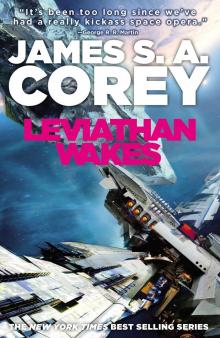 Leviathan Wakes
Leviathan Wakes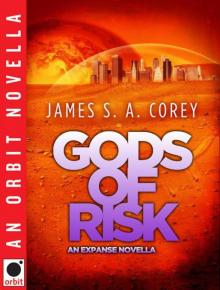 Gods of Risk
Gods of Risk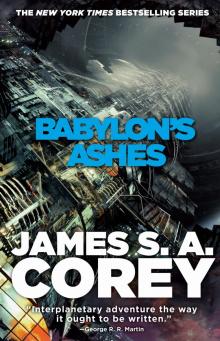 Babylon's Ashes
Babylon's Ashes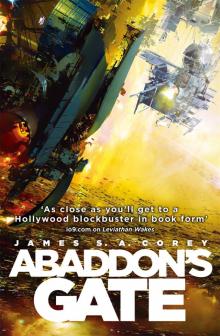 Expanse 03 - Abaddon’s Gate
Expanse 03 - Abaddon’s Gate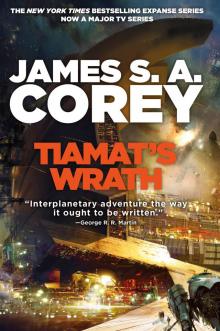 Tiamat's Wrath
Tiamat's Wrath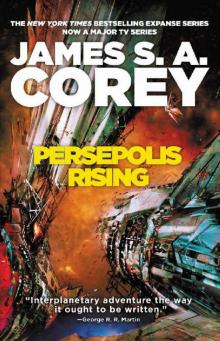 Persepolis Rising
Persepolis Rising The Butcher of Anderson Station
The Butcher of Anderson Station The Churn
The Churn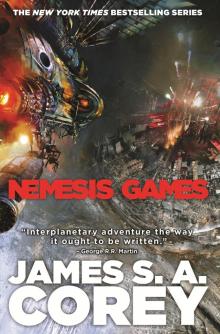 Expanse 05 - Nemesis Games
Expanse 05 - Nemesis Games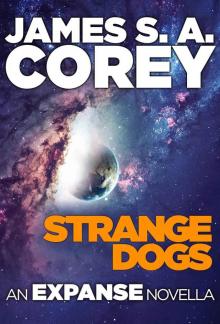 Strange Dogs
Strange Dogs Honor Among Thieves: Star Wars
Honor Among Thieves: Star Wars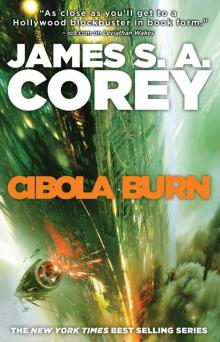 Cibola Burn
Cibola Burn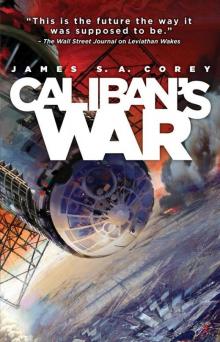 Caliban's War
Caliban's War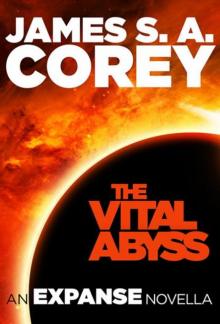 The Vital Abyss
The Vital Abyss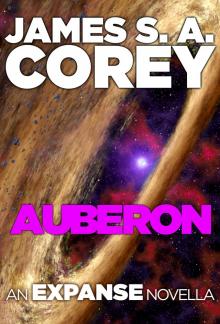 Auberon
Auberon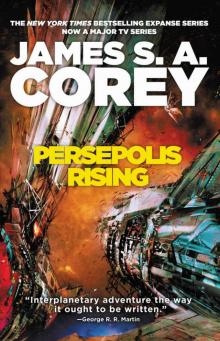 Persepolis Rising (The Expanse)
Persepolis Rising (The Expanse)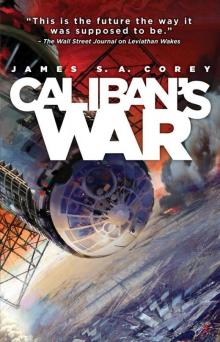 Caliban's War: Book Two of the Expanse series
Caliban's War: Book Two of the Expanse series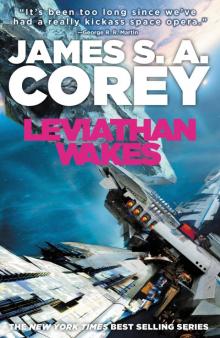 Leviathan Wakes: Book One of The Expanse
Leviathan Wakes: Book One of The Expanse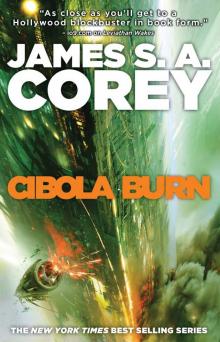 Cibola Burn (Expanse)
Cibola Burn (Expanse)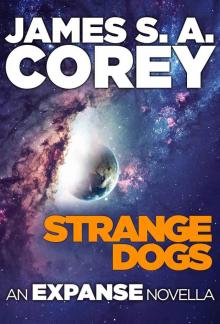 Strange Dogs (Expanse)
Strange Dogs (Expanse)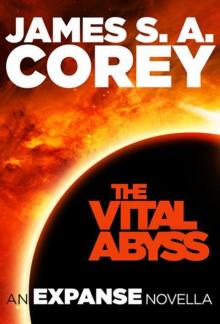 The Vital Abyss: An Expanse Novella (The Expanse)
The Vital Abyss: An Expanse Novella (The Expanse) Leviathan Wakes e-1
Leviathan Wakes e-1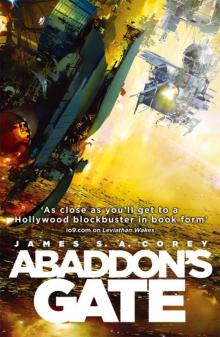 Abaddon's Gate e-3
Abaddon's Gate e-3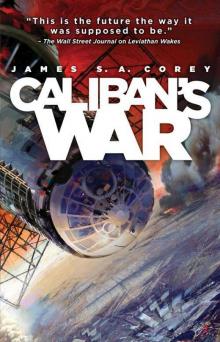 Caliban;s war e-2
Caliban;s war e-2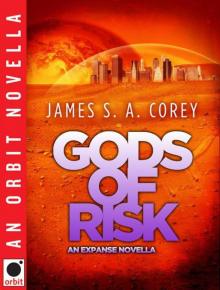 Gods of Risk: An Expanse Novella
Gods of Risk: An Expanse Novella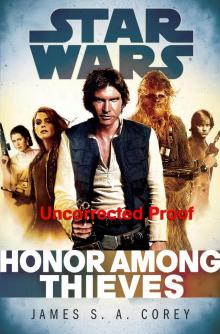 Honor Among Thieves: Star Wars (Empire and Rebellion)
Honor Among Thieves: Star Wars (Empire and Rebellion)